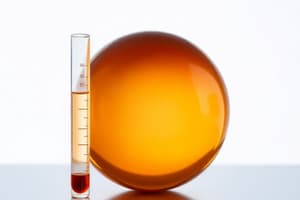Podcast
Questions and Answers
Which term describes a mixture where the components cannot be visually distinguished?
Which term describes a mixture where the components cannot be visually distinguished?
- Heterogeneous mixture
- Compound
- Element
- Homogeneous mixture (correct)
What characteristic distinguishes plasma from other states of matter?
What characteristic distinguishes plasma from other states of matter?
- Electrons are detached from nuclei (correct)
- Only gas molecules are present
- Particles have long-range order
- Particles are tightly packed
Which separation technique involves the use of a porous material to filter out larger particles from a mixture?
Which separation technique involves the use of a porous material to filter out larger particles from a mixture?
- Filtration (correct)
- Distillation
- Evaporation
- Chromatography
Which of the following is NOT a type of pure substance?
Which of the following is NOT a type of pure substance?
In what state of matter are the particles closely packed but still able to vibrate in place?
In what state of matter are the particles closely packed but still able to vibrate in place?
What process involves separating a mixture based on the different boiling points of its components?
What process involves separating a mixture based on the different boiling points of its components?
Which term refers to a mixture that has a uniform composition throughout and cannot be easily separated by physical means?
Which term refers to a mixture that has a uniform composition throughout and cannot be easily separated by physical means?
Which of the following describes a phase formed by fermionic particles at low temperatures?
Which of the following describes a phase formed by fermionic particles at low temperatures?
What significant contribution did James Chadwick make to atomic theory?
What significant contribution did James Chadwick make to atomic theory?
What is the main idea of Ernest Rutherford's Nuclear Model?
What is the main idea of Ernest Rutherford's Nuclear Model?
What does the octet rule state regarding valence electrons?
What does the octet rule state regarding valence electrons?
What unique aspect does Schrödinger's equation introduce to atomic theory?
What unique aspect does Schrödinger's equation introduce to atomic theory?
What does the Heisenberg Uncertainty Principle state?
What does the Heisenberg Uncertainty Principle state?
Which of the following best describes Niels Bohr's improvement on the atomic model?
Which of the following best describes Niels Bohr's improvement on the atomic model?
What happens to a metal atom during ionic bonding?
What happens to a metal atom during ionic bonding?
In ionic bonding, what is the electrostatic attraction primarily responsible for?
In ionic bonding, what is the electrostatic attraction primarily responsible for?
Which of the following correctly describes ionic bonding?
Which of the following correctly describes ionic bonding?
How is the maximum number of electrons in a principal energy level calculated?
How is the maximum number of electrons in a principal energy level calculated?
Which of the following pairs of elements is likely to form an ionic bond?
Which of the following pairs of elements is likely to form an ionic bond?
Which atomic model addresses the probabilistic nature of electron behavior?
Which atomic model addresses the probabilistic nature of electron behavior?
When sodium reacts with chlorine, what is the result?
When sodium reacts with chlorine, what is the result?
Which statement about non-metals in ionic bonding is true?
Which statement about non-metals in ionic bonding is true?
Which scientist's work contributed to the concept of fixed energy levels in atomic structure?
Which scientist's work contributed to the concept of fixed energy levels in atomic structure?
Which statement best describes the location of metals on the periodic table?
Which statement best describes the location of metals on the periodic table?
What is the primary characteristic of simple covalent substances regarding their physical state at room temperature?
What is the primary characteristic of simple covalent substances regarding their physical state at room temperature?
What does a chemical formula represent in chemistry?
What does a chemical formula represent in chemistry?
Which of the following correctly describes the criss-cross method for writing ionic compounds?
Which of the following correctly describes the criss-cross method for writing ionic compounds?
What is the correct chemical name for the compound represented by the formula CaI2?
What is the correct chemical name for the compound represented by the formula CaI2?
Which ion will have a 3- charge in the compound Ca3P2?
Which ion will have a 3- charge in the compound Ca3P2?
What is the correct name for the ionic compound represented as FeCl3?
What is the correct name for the ionic compound represented as FeCl3?
In the context of naming ionic compounds, what does the term 'Latin System' refer to?
In the context of naming ionic compounds, what does the term 'Latin System' refer to?
Which of the following correctly describes the compound Cu2S?
Which of the following correctly describes the compound Cu2S?
What is the maximum number of electrons allowed in the third energy level?
What is the maximum number of electrons allowed in the third energy level?
According to the Aufbau principle, which subshell is filled after 3p?
According to the Aufbau principle, which subshell is filled after 3p?
Which statement is true regarding the Pauli Exclusion Principle?
Which statement is true regarding the Pauli Exclusion Principle?
What does Hund’s Rule state regarding electron configuration?
What does Hund’s Rule state regarding electron configuration?
What is the correct electron configuration for Germanium (Ge)?
What is the correct electron configuration for Germanium (Ge)?
How many electrons can be held in the second energy level?
How many electrons can be held in the second energy level?
Which of the following statements describes an orbital?
Which of the following statements describes an orbital?
Which of the following sequences correctly illustrates the order of filling orbitals?
Which of the following sequences correctly illustrates the order of filling orbitals?
Flashcards are hidden until you start studying
Study Notes
States of Matter
- Matter is anything that occupies space and possesses mass.
- Three main states: solid, liquid, gas.
- Solid: Particles are closely packed in a fixed structure.
- Liquid: Atoms have many nearest neighbors and can flow, with no long-range order.
- Gas: Molecules are widely spaced, allowing for free movement.
- Plasma: Electrons are stripped from nuclei, conducting electricity.
- Bose-Einstein Condensate: Formed by cooling bosons to near absolute zero.
- Fermionic Condensate: A superfluid phase formed by fermionic particles at low temperatures.
Classification of Matter
- Pure substances include elements and compounds.
- Mixtures: Can be homogeneous (solutions) or heterogeneous (colloids, suspensions).
- A homogeneous mixture consists of solutes dissolved in a solvent, e.g., saltwater.
Separation Techniques
- Chromatography: Separates mixture components by differential movement through a medium.
- Distillation: Purifies liquids by vaporizing and condensing components.
- Evaporation: Separates dissolved salts in homogeneous mixtures.
- Filtration: Uses porous materials to separate solid particles from liquids.
Atomic Theory
- Atomic theory explains the nature and behavior of matter through various models.
- Ernest Rutherford (1911): Proposed the nuclear model with a positively charged nucleus.
- Niels Bohr (1913): Developed the planetary model, stipulating fixed orbits for electrons.
- Werner Heisenberg (1927): Introduced the uncertainty principle regarding the precise position and speed of particles.
- Erwin Schrödinger (1927): Formulated Schrödinger’s equation, forming the quantum mechanical model of atoms.
Electron Configuration
- Principal energy levels are numbered from n = 1 to n = 7.
- The maximum number of electrons in an energy level can be calculated using the formula (2n^2).
- Order of filling orbitals follows the Aufbau principle, with lower energy orbitals filled first.
Rules of Electron Configuration
- Pauli Exclusion Principle: An orbital can hold a maximum of two electrons with opposite spins.
- Hund’s Rule: Electrons fill degenerate orbitals singly before pairing up.
- Atoms tend towards having full outer shells (octet rule) for stability.
Chemical Bonding
- Ionic Bonding: formed through the transfer of electrons between metals and non-metals, resulting in positively and negatively charged ions.
- Sodium chloride example: Sodium loses an electron (Na+), chlorine gains an electron (Cl-), forming NaCl.
Chemical Nomenclature
- Chemical Formula: Symbolic expression showing the types and number of atoms in a compound.
- Chemical Name: Scientific naming according to IUPAC standards.
- Criss-Cross Method: Used to derive formulas, where ion charges are transposed to become subscripts.
Ionic Compound Examples
- CaO represents calcium oxide.
- NaBr signifies sodium bromide.
- CuBr corresponds to cuprous bromide.
Naming Ionic Compounds with Latin System
- Compounds can be named reflecting the oxidation states of the metal ions.
- Examples include gold(III) nitride and silver chloride.
Covalent Compounds
- Named based on the number of each atom present, e.g., SO3 is sulfur trioxide.
Studying That Suits You
Use AI to generate personalized quizzes and flashcards to suit your learning preferences.




